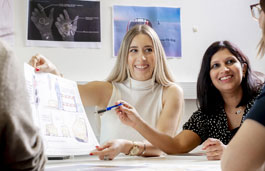Search
Applied Innovation Leadership MA
Study level: PostgraduateConversion course

This course aims to equip you with the knowledge and skills required to lead innovation and change in global organisations, governments, social enterprises and NGOs.
Year of entry
2024-25
Location
Coventry University (Coventry)
Study mode
Full-time
Duration
1 year full-time
Course code
AHT062
Start date
September 2024
January 2025
May 2025
Course overview
Due to the dynamic nature of innovation, applicants from any discipline are welcome.
The course aims to meld recent graduates with seasoned professionals to create a working environment that combines raw talent with hardened experience.
This course focuses on the most important aspects of innovation as a positive driver for change. Only through the utilisation of cutting-edge thinking in design, innovation, and business practice, can humanity face the problems of tomorrow.
Joint Top Modern University for Career Prospects
Guardian University Guide 2021 and 20225 QS Stars for Teaching and Facilities
QS Stars University RatingsTop 5 UK Student City in England (Coventry)
QS Best Student Cities Index 2024Why you should study this course
- Innovation is at the very centre of modern business, government and charity sectors - without innovation, entire industries cease to exist
- This course recognises the need for contemporary approaches to innovation that provide solutions to some of the world’s most intractable problems. To this end, Coventry University is committed to the United Nations Sustainable Development Goals that identify the seventeen most pressing issues facing humanity
- Supported by staff who are inspired by innovation to develop real-world solutions to complex problems, you will be empowered to pursue deep learning within one of the most exciting facets of the modern work environment
- Coventry University has invested in rapid prototyping technologies to provide you with opportunities2 to 'think the unthinkable' and act as a real catalyst for positive change within industry and society at large
- You can expect to engage in solving real-world problems in a contemporary learning environment that mimics that of the most innovative organisations on Earth.
What you'll study
We regularly review our course content, to make it relevant and current for the benefit of our students. For these reasons, course modules may be updated.
How you'll learn
Utilising teaching spaces in the Delia Derbyshire complex, you and your peers will have the chance to explore innovation in all its guises during the course; working collaboratively across semester intakes to provide thought-provoking solutions to contemporary problem domains.
You will receive a course of interactions designed to provide the foundations upon which you will contribute through extensive self-directed study. Academic staff will be on hand to advise and guide you through your learning journey.
Practical group project work will be at the centre of course delivery, equipping you with the necessary knowledge and skills to work in highly complex innovation environments. You will aim to become a master collaborator and communicator through continuous feedback and feedforward interactions with academic staff and peers. You will learn to manage stakeholders within business, government and NGOs.
Teaching contact hours
Part of university life is undertaking self-directed learning (SDL). Across the course of the week, you will have non ‘taught’ time that allows you to work independently to apply the skills you have learnt in taught or facilitated sessions to your projects or assignment briefs. This is particularly important in the school of art and design as it allows you to put into practice, making in workshop and studio spaces.
This self-directed learning allows you to monitor and self-evaluate your development and how best to manage this time to best impact your creative work. SDL is key to designing and making as it is a process that takes discipline and repetition. This mode of learning underpins our community of practice approach.
The number of full-time contact hours may vary from semester to semester, however, on average, it is likely to be around eight contact hours per week in the first year, made up of group tutorials, seminars, lectures, and one-to-ones. Additionally, you will be expected to undertake significant self-directed study of approximately 24 hours each week, depending on the demands of individual modules.
As an innovative and enterprising institution, the university may seek to utilise emerging technologies within the student experience. For all courses (whether on-campus, blended, or distance learning), the university may deliver certain contact hours and assessments via online technologies and methods.
Since COVID-19, we have delivered our courses in a variety of forms, in line with public authority guidance, decisions, or orders and we will continue to adapt our delivery as appropriate. Whether on campus or online, our key priority is staff and student safety.
Assessment
This course will be assessed using a variety of methods which will vary depending on the module.
Assessment methods may include:
- Written coursework
- Practical project work
- Group work
- Presentation
- Posters
- Films
- Roadmaps
- Prototypes
The Coventry University Group assessment strategy ensures that our courses are fairly assessed and allows us to monitor student progression towards achieving the intended learning outcomes.
Entry requirements
Typical offer for 2024/25 entry.
Fees and funding
2024/25 tuition fees.
| Student | Full-time | Part-time |
|---|---|---|
| UK, Ireland*, Channel Islands or Isle of Man | £11,200 | Not available |
| EU | £11,200 per year with EU Support Bursary** £18,600 per year without EU Support Bursary** |
Not available |
| International | £18,600 | Not available |
For advice and guidance on tuition fees3 and student loans visit our Postgraduate Finance page.
We offer a range of international scholarships to students all over the world. For more information, visit our International Scholarships page.
Tuition fees3 cover the cost of your teaching, assessments, facilities and support services. There may be additional costs not covered by this fee such as accommodation and living costs, recommended reading books, stationery, printing and re-assessments should you need them.
The following are additional costs not included in the tuition fees:
- Any optional overseas field trips or visits: £400+ per trip.
- Any costs associated with securing, attending or completing a placement (whether in the UK or abroad).
*Irish student fees
The rights of Irish residents to study in the UK are preserved under the Common Travel Area arrangement. If you are an Irish student and meet the residency criteria, you can study in England, pay the same level of tuition fees as English students and utilise the Tuition Fee Loan.
**EU Support Bursary
Following the UK's exit from the European Union, we are offering financial support to all eligible EU students who wish to study an undergraduate or a postgraduate degree with us full-time. This bursary will be used to offset the cost of your tuition fees to bring them in line with that of UK students. Students studying a degree with a foundation year with us are not eligible for the bursary.
Facilities
The Delia Derbyshire complex represents a major transformation of the university’s arts and humanities facilities. It combines the former Graham Sutherland and Maurice Foss buildings, which are now totally refurbished, along with an innovative extension hosting cutting-edge equipment and spaces.
The complex boasts a hyper studio designed for cross-disciplinary projects, and immersive studios with the latest virtual reality and mixed reality technologies, enhancing the college’s creative, teaching and learning spaces and offering students sector-leading facilities in a collaborative and inclusive environment4, during their course.
The space will also be open to the public with a gallery, café and events atrium where students, staff and visiting artists can showcase their work to members of the community.
Careers and opportunities
Upon successful completion of this course, you will be able to:
- undertake research to synthesise and articulate advanced knowledge of both theoretical and applied aspects of innovation in its four main forms – disruptive, radical, sustaining, and incremental
- realise complex projects through the creation of ambitious artefacts for identified and diverse audiences and/or contexts
- contribute to shaping a global contemporary discourse by engaging with innovative, experimental, hybrid and creative approaches to one or more of the four types of innovation – disruptive, radical, sustaining, or incremental
- deploy advanced personal skills, judgement, and critical awareness to facilitate innovative problem-solving for a wide range of creative, professional, social, and collaborative contexts
- innovate while applying critical thinking to a selected range of contextualised problem domains that embrace user requirements, brand identity and/or social imperatives
- demonstrate knowledge and understanding as to the principles and theories of both, entrepreneurship and intrapreneurship to facilitate strategic and tactical leadership.
This course aims to give you the requisite knowledge and skills for leadership in any industry that places innovation at its centre. This will typically take the form of innovation units within large organisations, governments and NGOs. In addition, the course aims to provide you with core competencies cognisant with starting your own business or social enterprise.
Our Talent Team is on hand to offer tailored career and enterprise information if you wish to gain employment within course-specific industries. It provides specialist careers information, advice, and guidance to all students, regardless of career aspirations. Our dedicated enterprise officers also offer valuable assistance on how to pursue an entrepreneurial pathway.
Graduate Immigration Route visa
Based on current information from the UK Government, international students whose study extends beyond summer 2021 may be eligible for a visa under the UK Government’s Graduate Immigration Route, which will enable students to stay and work, or look for work, in the UK at any skill level for up to two (2) years. Check the most up to date guidance available to check your eligibility and any updates from the UK Government before making an application or enrolment decision.



